Introduction to Nuts
Nuts have gained recognition as nutritional powerhouses, often categorized as superfoods due to their dense nutrient content. These small yet mighty snacks are packed with essential vitamins, minerals, healthy fats, and protein, making them a valuable addition to a balanced diet. One of the key benefits of nuts is their rich profile of unsaturated fats, particularly omega-3 and omega-6 fatty acids, which are known to support heart health. Consuming nuts regularly can help reduce cholesterol levels and improve overall cardiovascular function.
Moreover, nuts are an excellent source of plant-based protein, which plays a vital role in muscle maintenance and growth. They often contain a variety of vitamins such as vitamin E, B vitamins, and essential minerals like magnesium, potassium, and zinc. These nutrients contribute to various bodily functions, including energy production, immune support, and maintaining healthy skin. Additionally, nuts are high in dietary fiber, which aids in digestion and promotes a feeling of satiety, potentially assisting weight management efforts.

It is essential for individuals to be mindful of their nut choices. Opting for unsalted varieties can significantly lower sodium intake without sacrificing the nutritional benefits that nuts offer. Nuts are rich in healthy fats, protein, fiber, vitamins, and minerals, making them a valuable addition to one’s diet when consumed appropriately. When shopping for nuts, look for labels that specify “unsalted” or “no added salt” to ensure that you are making a healthier choice.
Nuts also possess antioxidant properties, thanks to compounds like polyphenols, which can combat oxidative stress and inflammation in the body. This makes them effective contributors in the prevention of chronic diseases such as obesity, diabetes, and certain cancers. Furthermore, incorporating nuts into meals can enhance flavor and texture, making them not only a healthy choice but also a culinary delight.
In conclusion, the nutritional benefits of nuts are substantial, and their role in a well-rounded diet cannot be overstated. Their combination of healthy fats, protein, vitamins, minerals, and antioxidants sets the stage for discussing which types of nuts are particularly beneficial and which may be less advantageous for health.
Nuts You Should Eat: Overview
Nuts are nutrient-dense foods that offer a myriad of health benefits, making them a superior choice for incorporation into a balanced diet. Among the various types of nuts, some stand out for their exceptional nutritional profiles and health-promoting properties. Here are six nuts that are highly recommended for consumption.
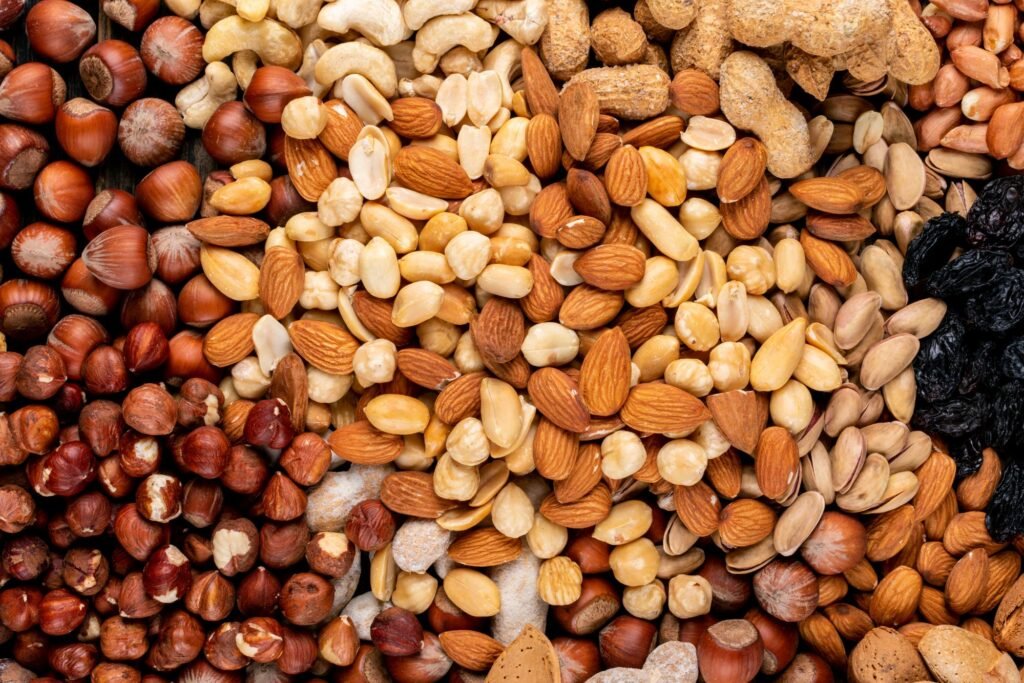
Almonds are widely recognized for their high vitamin E content, which acts as a potent antioxidant. They are also a rich source of healthy fats, protein, and magnesium, contributing positively to heart health and weight management by promoting satiety.
Walnuts distinguish themselves with their high omega-3 fatty acid content, which is critical for brain health and has anti-inflammatory properties. Regular walnut consumption has been linked to improved cognitive function, making them an excellent choice for maintaining mental sharpness.
Pistachios offer a balanced combination of protein, fiber, and healthy fats. They support heart health by improving cholesterol levels and are recognized for their role in helping manage weight due to their satiating nature.
Cashews are particularly rich in magnesium, essential for various bodily functions including muscle and nerve health. Their unique composition supports bone health and contributes positively to daily energy levels.
Brazil nuts are a powerhouse of selenium, a mineral crucial for thyroid function and antioxidant defense. Incorporating Brazil nuts into the diet can enhance overall health and may even support heart and immune function.
Finally, macadamia nuts are known for their high monounsaturated fat content, which promotes healthy cholesterol levels. They also support brain function and may aid in reducing inflammation in the body.
These six nuts not only provide essential nutrients but also contribute to heart health, weight management, and improved cognitive function. Regularly including a variety of these nuts in your diet can lead to enhanced overall well-being.
1. Almonds: The Heart-Friendly Snack
Almonds are widely recognized as a heart-friendly snack, owing to their rich nutritional profile. High in vitamin E, these nuts serve as potent antioxidants that help combat oxidative stress and may reduce the risk of heart disease. Additionally, almonds contain monounsaturated fats, which are beneficial for maintaining healthy cholesterol levels. Regular consumption of almonds has been linked to improved levels of HDL (the “good” cholesterol) while potentially lowering LDL (the “bad” cholesterol). This dual effect makes almonds an excellent choice for heart health.
Furthermore, the presence of antioxidants in almonds, coupled with their healthy fat content, enhances their versatility in various dishes. They can be enjoyed raw, roasted, or as almond butter, allowing for easy integration into a diverse diet. Almonds can be sprinkled over salads, blended into smoothies, or used as a topping for yogurt, making them not only nutritious but also enjoyable to consume.
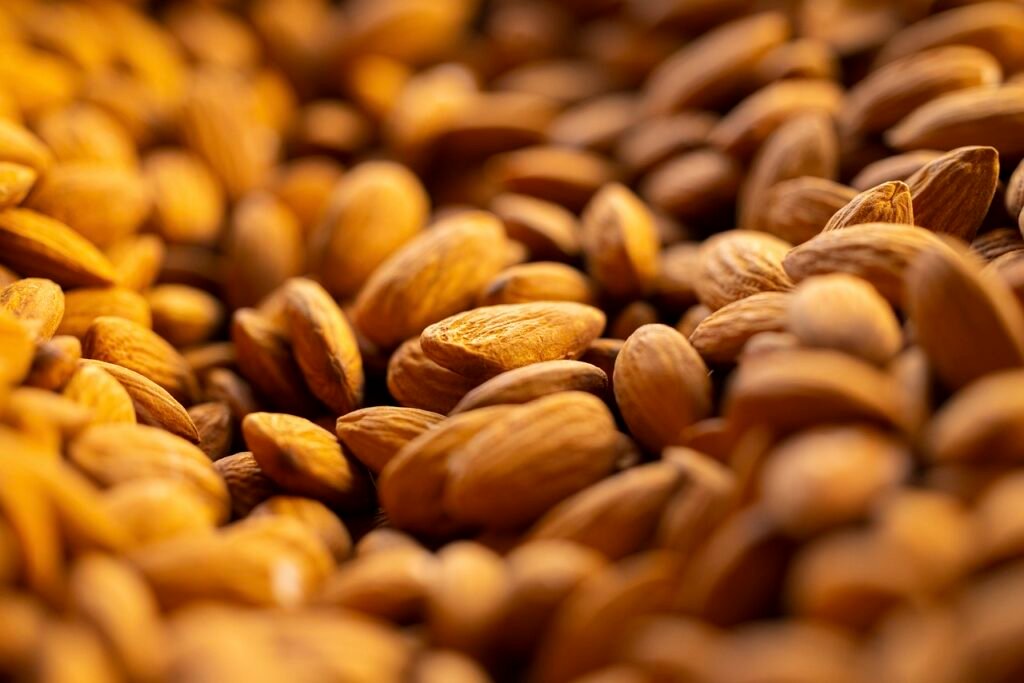
In terms of weight management, almonds can be quite beneficial. Research suggests that the healthy fats and fiber found in almonds promote satiety, which may help control appetite and reduce overall calorie intake. Additionally, almonds have a low glycemic index, contributing to better blood sugar control, making them suitable for those monitoring their blood sugar levels. This particular feature is especially salient for individuals with diabetes or those seeking to prevent this condition.
In summary, almonds emerge as a powerful ally for heart health, weight management, and blood sugar control. Their impressive vitamin E content, antioxidant properties, and positive effects on cholesterol levels accentuate the importance of incorporating almonds into one’s diet for broader health benefits. For those looking to enhance their overall well-being, adding almonds to meals may provide significant advantages while also delivering a satisfying crunch.
2. Walnuts: A Brain Booster
Walnuts are often celebrated for their impressive nutrient profile, particularly their high content of omega-3 fatty acids, which play a crucial role in promoting brain health. These polyunsaturated fats, specifically alpha-linolenic acid (ALA), are essential components of neuronal membranes and are vital for maintaining cognitive function. Research indicates that walnuts are not only beneficial for brain health but may also support overall mental well-being.
Multiple studies have linked the regular consumption of walnuts to improvements in cognitive performance. For instance, a study published in the journal Nutrition Reviews highlighted that individuals who included walnuts in their diet exhibited better cognitive abilities, including enhanced memory and learning skills. This improvement is attributed to the omega-3 fatty acids and other bioactive compounds present in walnuts that may help reduce oxidative stress and inflammation in the brain, both of which are associated with cognitive decline.

Furthermore, walnuts contain antioxidants such as polyphenols that may provide additional protective effects against neurodegenerative diseases. The anti-inflammatory properties of walnuts contribute to better vascular health, which is essential for optimal brain function, as adequate blood flow ensures that the brain receives the necessary nutrients and oxygen. This makes walnuts a valuable addition to any diet aimed at preserving cognitive health as one ages.
Incorporating walnuts into meals is relatively simple, whether they are added to salads, blended into smoothies, or consumed as a snack. However, it is important to adhere to appropriate serving sizes, as their calorie density can lead to excessive caloric intake. Overall, walnuts stand out as an exceptional food choice, showcasing their role as a brain booster and contributing positively to one’s health. As dietary habits evolve towards greater awareness of nutrition, walnuts deserve a prominent place on the list of superfoods for brain health.
3. Pistachios: A Nut for Heart Health
Pistachios, a popular and nutritious nut, are often celebrated for their unique health benefits, particularly their contribution to heart health. Rich in unsaturated fats, these nuts can help reduce cholesterol levels and improve cardiovascular health. The inclusion of pistachios in a balanced diet may lower the risk of heart disease, making them a favorable choice for those prioritizing their heart’s well-being.
In addition to their heart health benefits, pistachios also play a significant role in weight management. Their high protein content, combined with healthy fats and dietary fiber, promotes feelings of fullness. This satiety can help individuals manage their weight more effectively by reducing the likelihood of overeating. Consuming pistachios as a snack may assist in curbing cravings, making them a beneficial addition to a weight-loss plan.
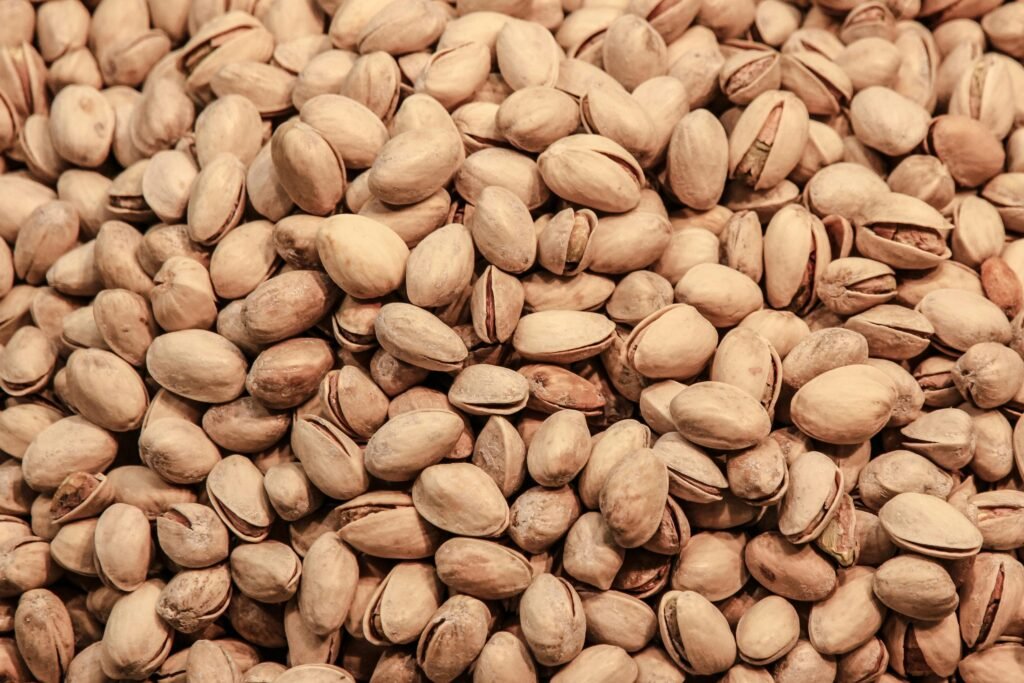
Furthermore, the impressive fiber content found in pistachios supports digestive health. Fiber is essential for a properly functioning digestive system, aiding in regular bowel movements and overall gastrointestinal health. When combined with the other nutrients present in these nuts, such as vitamin B6, pistachios not only contribute to heart health but also enhance metabolic function and energy levels. Vitamin B6 is vital for energy production in the body and aids in the metabolism of proteins and carbohydrates, which can lead to improved stamina and vitality.
By incorporating pistachios into your diet, you harness the benefits of this nutrient-dense food. Their appealing taste, along with their potential to support heart health, aid in weight management, and provide essential nutrients, makes them an excellent choice for health-conscious individuals looking to make wise food selections.
4. Brazil Nuts: A Selenium Superfood
Among the variety of nuts available, Brazil nuts stand out as a particularly rich source of selenium, an essential trace mineral vital for maintaining various bodily functions. Selenium plays a significant role in thyroid health, supporting its hormone production, and is crucial for a robust immune system. The high levels of selenium found in Brazil nuts can contribute to enhancing antioxidant defenses and reducing inflammation in the body.
Due to their exceptional selenium concentration, it is important to consider recommended serving sizes when incorporating Brazil nuts into your diet. A mere one to two Brazil nuts per day can provide more than the daily recommended intake of selenium for most adults, making them an efficient selenium source. Overconsumption can lead to selenium toxicity, which may cause symptoms such as gastrointestinal distress, fatigue, and neurological issues. Therefore, moderation is key when adding these nuts to your dietary regimen.
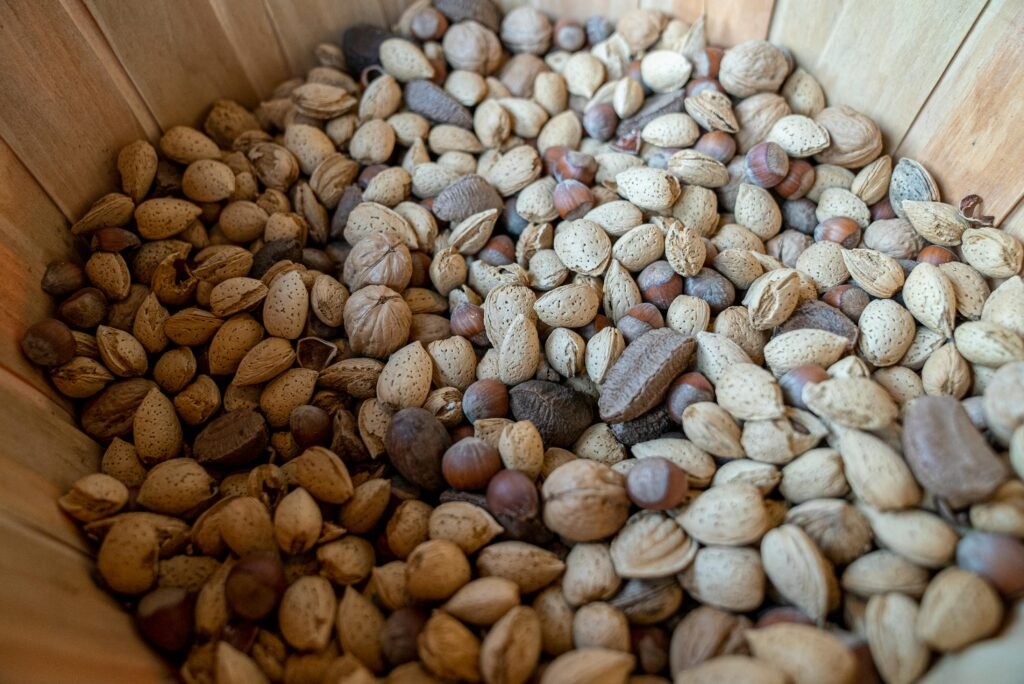
Integrating Brazil nuts into your meals can be both enjoyable and nutritious. They can be consumed raw, roasted, or added to various dishes. Consider chopping Brazil nuts and sprinkling them over salads or oatmeal for a nutritious crunch. Blending them into smoothies can also enhance the creamy texture while providing significant health benefits. Additionally, they can serve as a flavorful addition to baked goods or homemade granola mixes.
Overall, the inclusion of Brazil nuts in your diet can be a straightforward way to boost your selenium intake, thus positively impacting your thyroid function and supporting immune health. By adhering to the recommended serving sizes, you can enjoy the nutrient-dense benefits of these remarkable nuts without the risk of excessive selenium consumption.
5. Pecans: Antioxidant-Rich Delight
Pecans are not only a delightful addition to a variety of dishes but also an extraordinary source of antioxidants that can play a pivotal role in enhancing overall health. These nuts are packed with numerous compounds that help combat oxidative stress, a major contributor to chronic diseases, including heart disease and certain types of cancer. The high levels of vitamin E, ellagic acid, and phenolic compounds found in pecans contribute to their antioxidant properties, thus making them an excellent choice for those seeking to bolster their health.
Heart health is another significant advantage of including pecans in one’s diet. Rich in monounsaturated fats, particularly oleic acid, pecans can help maintain healthy cholesterol levels. Studies have indicated that regular consumption of these nuts may lower LDL cholesterol, thereby reducing the risk of cardiovascular diseases. Furthermore, the presence of magnesium in pecans supports overall heart function, helping to regulate blood pressure and maintain a healthy heartbeat.

Fiber content is yet another reason to indulge in these rich nuts. A handful of pecans not only satisfies your palate but also provides a substantial amount of dietary fiber, which is essential for digestion. Fiber plays a critical role in gastrointestinal health, helping to prevent constipation and promote regularity. Additionally, the healthy fats and fiber in pecans work synergistically to keep you feeling full, which may assist in weight management efforts.
Pecans are versatile and can enhance both savory and sweet dishes. Their rich, buttery flavor makes them ideal for use in salads, pestos, and as a topping for various entrees. In baking, they can add crunch to desserts like pies and cookies. Their adaptability in culinary applications further solidifies pecans as a nutritious choice that contributes both flavor and health benefits.
6. Macadamia Nuts: The Healthy Fat Source
Macadamia nuts, often regarded as a premium nut variety, are particularly notable for their rich fatty acid composition. They contain a wealth of healthy monounsaturated fats, which are recognized for their numerous health benefits. These fats play a crucial role in supporting heart health by improving blood lipid levels and reducing the risk of cardiovascular diseases. Unlike saturated fats, the monounsaturated fats found in macadamia nuts have been associated with lower cholesterol levels, which is beneficial for maintaining overall cardiovascular wellness.
Additionally, the presence of healthy fats in macadamia nuts contributes significantly to weight management. Consuming foods that are high in healthy fats can enhance satiety, reducing the likelihood of overeating. This makes macadamia nuts a valuable snack option for those looking to maintain or lose weight. Their creamy texture and rich flavor also make them a satisfying addition to various dishes, from salads to desserts, providing both taste and nutrition.

Beyond their heart health and weight management benefits, macadamia nuts are rich in antioxidants and essential vitamins, such as vitamin A and several B vitamins. These nutrients further contribute to overall health and help combat oxidative stress in the body. Their versatility allows them to be incorporated into numerous recipes, enhancing everything from savory meals to sweet treats. Whether used as a topping for yogurt, blended into smoothies, or enjoyed as a stand-alone snack, macadamia nuts provide a nutritious and delicious option for those seeking a health-conscious lifestyle.
In conclusion, macadamia nuts are an excellent source of healthy fats that offer a range of health benefits. Their role in promoting heart health, supporting weight management, and their versatility in recipes makes them a must-include in a balanced diet.
Nuts You Can Avoid: Overview
While nuts can be a nutritious addition to many diets, some varieties are less beneficial than others. It is important to be aware of certain nuts that may pose health risks, potentially outweighing their advantages. This section will highlight six types of nuts that one might consider limiting or avoiding entirely.
First, some nuts are known for their high-calorie content. For instance, macadamia nuts, while flavorful, are extremely calorie-dense, making it easy to consume excessive amounts unknowingly. Such overconsumption can lead to weight gain, especially when calorie control is a priority. Additionally, pecans are another example of calorie-laden nuts, and incorporating them in moderation is essential to avoid unwanted calorie intake.

Another aspect to consider is the potential for allergies. For some individuals, certain nuts can trigger severe allergic reactions. For instance, cashews and hazelnuts might elicit responses in allergic individuals, necessitating their full avoidance to ensure safety.
Additionally, certain nuts are known to contain unhealthy fats. While most nuts are rich in healthy fats, some have higher levels of saturated fats. Coconut, typically classified as a nut, contains a substantial amount of saturated fat. Excessive consumption of these nuts may lead to health issues, including elevated cholesterol levels, which can affect cardiovascular health.
Finally, digestive issues can arise from consuming certain nuts. For instance, pistachios can cause bloating and discomfort in sensitive individuals. They contain higher levels of fiber, which, while beneficial in moderation, can lead to digestive disturbances in excessive amounts.
Being informed about these nuts can aid in making healthier dietary choices. Prioritizing higher-quality nuts and being cautious with those listed can contribute positively to one’s overall nutrition.
1. Cashews: High in Calories and Allergens
Cashews are a popular nut that appeal to many due to their creamy texture and rich flavor. However, it is essential to recognize that they are also notably high in calories, which can contribute to excessive caloric intake if consumed in large amounts. A one-ounce serving of cashews contains approximately 157 calories, significantly higher than some of their nut counterparts. This calorie density means that portion control is critical for those monitoring their caloric consumption, particularly in weight management contexts.
Another important consideration is the allergenic potential of cashews. Tree nut allergies are among the most common food allergies, and cashews are one of the primary culprits. An allergic reaction can manifest in symptoms ranging from mild to severe, including hives, swelling, and even anaphylaxis in extreme cases. Individuals with known tree nut allergies should approach cashews with caution and consult their healthcare provider before introducing them to their diet.

It is also worth noting that cashews contain relatively less protein compared to other nuts, such as almonds and pistachios. While they provide essential nutrients and healthy fats, those seeking higher protein options might turn to other varieties to meet their nutritional needs. A one-ounce serving of cashews contains about 5 grams of protein, while the same serving of almonds offers around 6 grams.
To enjoy cashews while mitigating potential downsides, moderation is key. Consider using cashews as part of a mixed nut trail mix or adding them as a topping to salads and dishes to enhance flavor without overindulging. Monitoring serving sizes can help maintain a balanced diet while still incorporating these tasty nuts.
2. Pine Nuts: Costly and Controversial
Pine nuts are often considered a delicacy due to their unique flavor and culinary versatility, utilized in a variety of dishes, from pesto to salads. However, they come with a hefty price tag that may deter many consumers. The cost of pine nuts can vary significantly, generally ranging from $15 to $30 per pound, making them one of the more expensive varieties available in the market. This high price is attributed to the labor-intensive harvesting process, primarily performed by hand, and the lengthy time it takes for pine trees to produce viable seeds.

In addition to their financial cost, pine nuts can pose certain health risks, the most notable being a condition known as pine nut syndrome. This syndrome is characterized by a bitter or metallic taste in the mouth, which can persist for several days. It is believed to occur due to specific compounds found in certain pine nuts, particularly from the species Pinus armandii. Although the condition is not life-threatening, it can lead to discomfort and the temporary alteration of taste, prompting some individuals to avoid pine nuts altogether.
When evaluating the nutritional profile of pine nuts in comparison to other nuts, they tend to be less nutrient-dense. While they do provide healthy fats, protein, and some vitamins, other alternatives, such as almonds or walnuts, often offer higher amounts of fiber and essential nutrients. Consequently, the high cost and potential side effects have led many nut enthusiasts to reconsider their options. Pine nuts, while tasty, may not be the most accessible or nutritionally beneficial choice when compared to other nuts that offer greater health benefits and affordability.
3. Peanuts: Legume Dangers
Peanuts, often mistaken for nuts due to their culinary uses, are technically legumes. This fundamental classification suggests that they may not possess the same health benefits attributed to tree nuts. Unlike almonds, walnuts, and cashews, which are rich in heart-healthy fats, fiber, and numerous vitamins and minerals, peanuts provide a different nutritional profile. While they do contain protein and various nutrients, their benefits may be overshadowed by certain concerns associated with their leguminous nature.
One significant concern regarding peanuts is their high susceptibility to aflatoxin contamination. Aflatoxins are toxic compounds produced by certain molds, primarily Aspergillus species, that can grow on crops like peanuts under specific conditions. Consumption of aflatoxin-contaminated peanuts can pose serious health risks, including liver damage and an increased risk of cancer. Consequently, it is imperative to ensure that peanuts are sourced from reputable suppliers who perform stringent testing to mitigate this risk. This level of caution is less frequently a concern with tree nuts, making them a potentially safer choice overall.

The allergenic potential of peanuts presents another significant issue. Peanut allergies are common and can lead to severe, life-threatening reactions in sensitive individuals. These allergic responses can vary in intensity but often manifest as skin reactions, gastrointestinal distress, or respiratory problems. In contrast, while tree nuts can also trigger allergies, the scope and prevalence differ, with many individuals being able to tolerate various tree nuts without issue. This difference highlights the importance of understanding the varied risk profiles among types of nuts and legumes.
In light of these concerns, individuals seeking to diversify their nut consumption for health benefits might consider limiting their intake of peanuts, choosing instead to incorporate tree nuts that offer a more favorable nutritional profile and reduced risk of contamination and allergy.
4. Nut Mixes: Hidden Additives and High Sodium
Nut mixes have gained immense popularity as convenient snacks, yet many pre-packaged varieties are laden with hidden additives that can significantly undermine their health benefits. While nuts themselves are packed with essential nutrients and healthy fats, the addition of ingredients like salt, sugar, and unhealthy oils transforms these mixes into less beneficial options. It is imperative to scrutinize the labels of these products to make informed dietary choices.
One common issue with pre-packaged nut mixes is their high sodium content. Excessive sodium intake has been linked to numerous health concerns, including hypertension and cardiovascular diseases. Manufacturers often add salt to enhance flavor, making these mixes seemingly appealing. However, it is crucial to understand that a single serving of some branded nut mixes can contain more than the recommended daily limit of sodium. Such high levels can negate the heart-healthy properties that nuts typically offer.
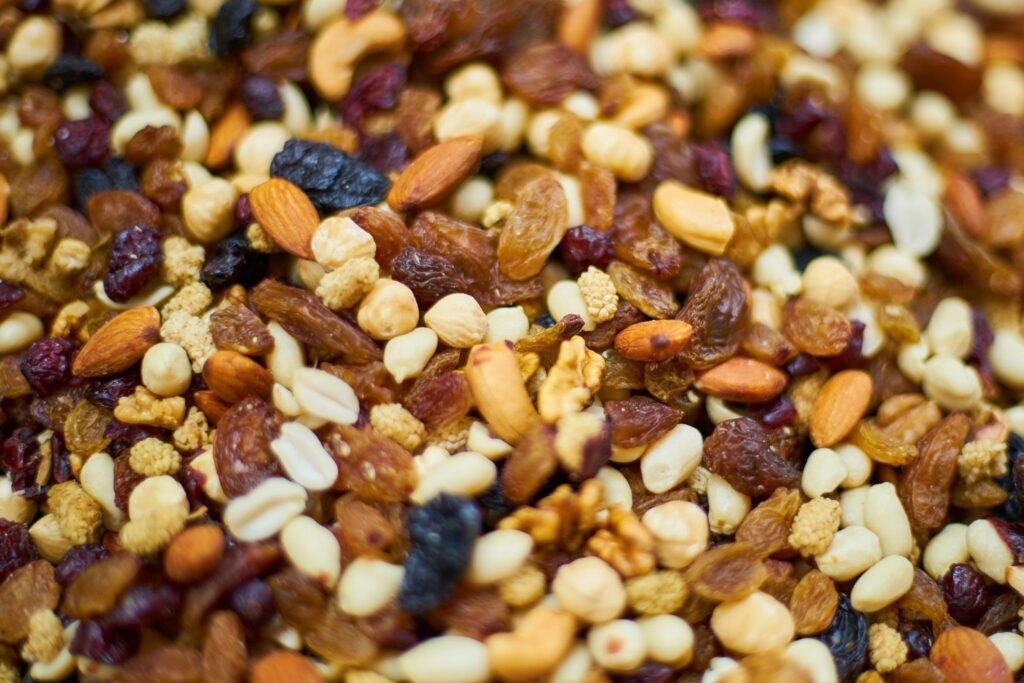
In addition to salt, many nut mixes also contain sugar, either in the form of added sweeteners or sugary coatings. This not only increases the calorie count but can also lead to spikes in blood sugar levels. Furthermore, unhealthy oils, often used for roasting or flavoring, can introduce trans fats and saturated fats into the mix, which contribute to various health issues, including obesity and heart disease.
When choosing nut mixes, consumers are encouraged to look for options with minimal additives. Products labeled as “raw” or “unsalted” provide more health benefits, retaining the natural state of the nuts without unnecessary preservatives or flavor enhancers. Moreover, considering alternatives such as making homemade nut mixes can ensure better control over ingredients while maximizing nutritional value. By opting for healthier choices, individuals can still enjoy the convenience of nut mixes without compromising their health.
5. Roasted Nuts: The Impact of Oil
Nuts are a popular snack, often enjoyed roasted due to their enhanced flavor and texture. However, the method of roasting and the type of oil used can significantly impact their nutritional profile. Many commercially available roasted nuts are prepared using unhealthy oils, such as soybean or palm oil, which are high in saturated fats. This alteration can detract from the numerous health benefits that raw nuts offer, such as heart-healthy unsaturated fats, fiber, and essential vitamins.
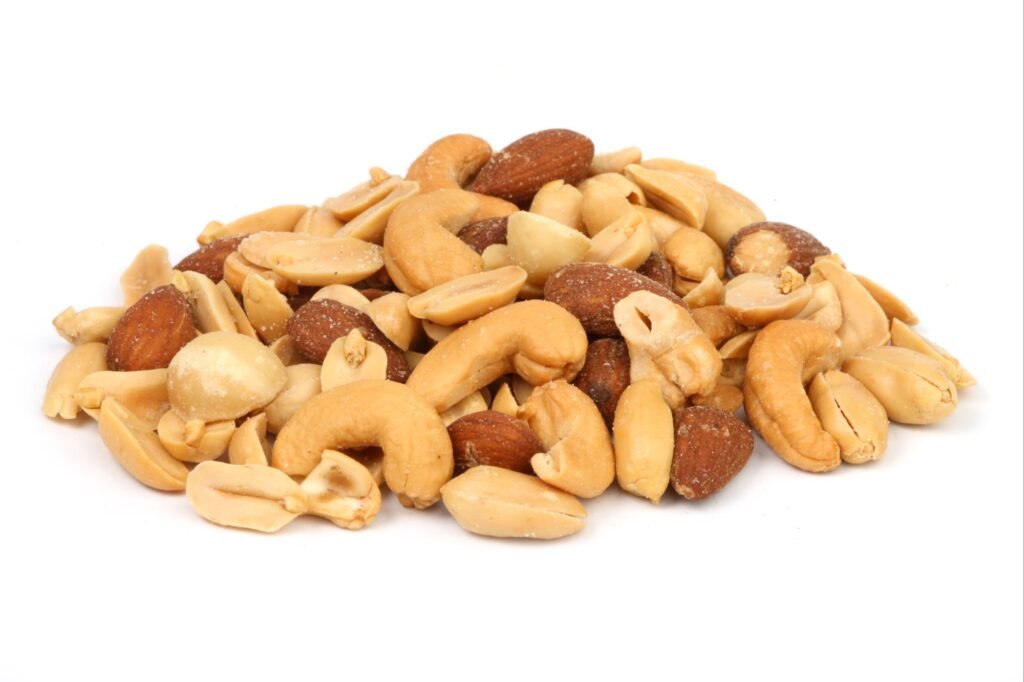
The process of roasting itself can also lead to changes in the chemical composition of nuts. While roasting can enhance the flavor and provide a crunchy texture, it can also reduce the levels of certain antioxidants. For example, studies have shown that roasting can diminish the amounts of beneficial polyphenols and certain vitamins, which may compromise the overall health benefits of the nuts. Furthermore, the high temperatures involved in roasting can lead to the formation of harmful compounds, which may pose additional health risks over time.
Portion control is another concern when it comes to roasted nuts. The tempting nature of roasted nuts, especially when flavored with salt or sugar, can lead to overconsumption. Excessive intake of roasted nuts, particularly those cooked in unhealthy oils, can contribute to weight gain and may counteract some of the beneficial properties of raw nuts. Therefore, it is crucial for consumers to be mindful of both the type of oil used during roasting and the quantities consumed to maintain a balanced diet.
In summary, while roasted nuts can be a tasty treat, their impact on health largely depends on the oil used and the amounts consumed. Opting for nuts roasted in healthier oils and practicing moderation can help maximize their benefits while minimizing potential drawbacks.
6. Salted Nuts: Excess Sodium Risks
Salted nuts, while enjoyable for their flavor, can pose several health risks primarily due to their high sodium content. Sodium plays a crucial role in regulating fluid balance and maintaining nerve transmission. However, excessive intake can lead to serious health complications. The American Heart Association recommends limiting sodium intake to less than 2,300 mg per day, with an ideal target of less than 1,500 mg for most adults. Consumption of salted nuts can quickly contribute to exceeding these recommended levels, thus increasing the risk of hypertension.
High blood pressure, or hypertension, is a significant health concern linked to a high-sodium diet. When sodium levels are elevated, it causes the body to retain more fluid, which increases blood volume and, consequently, blood pressure. Chronic hypertension can lead to severe health issues such as heart disease, stroke, and kidney damage. Moreover, excessive sodium intake has been associated with other vascular issues, reinforcing the argument against frequent consumption of salted snacks.
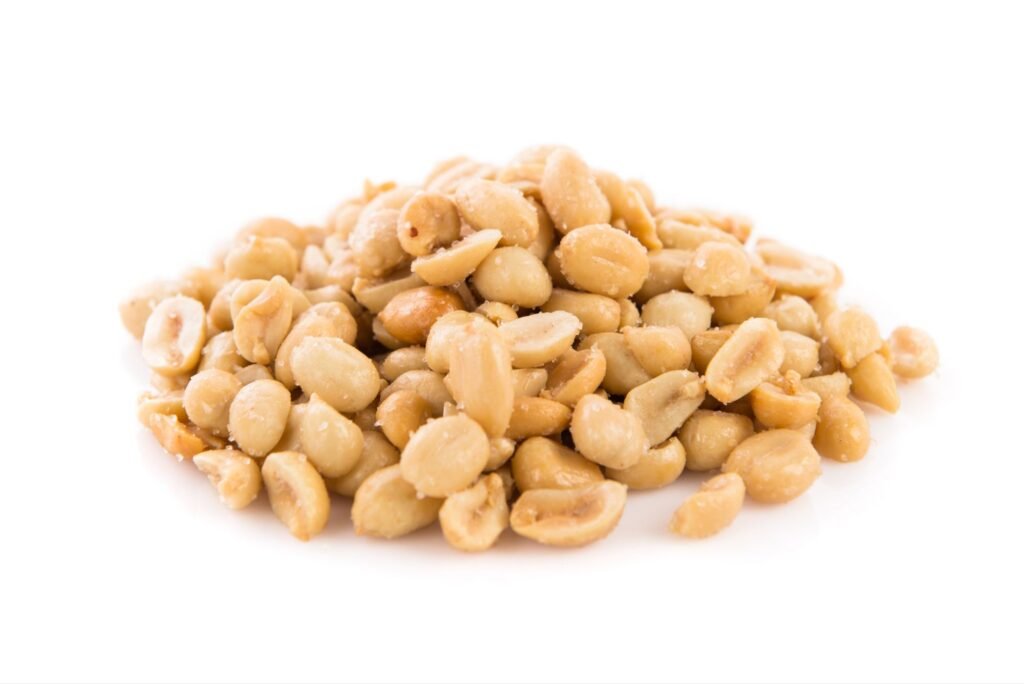
By being proactive about sodium consumption, individuals can enjoy nuts as part of a balanced diet while minimizing potential health risks. It is always advisable to consult with a healthcare professional when making significant changes to dietary habits, particularly for those with existing health conditions related to sodium intake.
Know about Wines: Click Here

1 thought on “6 Nuts You Should Eat and 6 You Can Avoid”